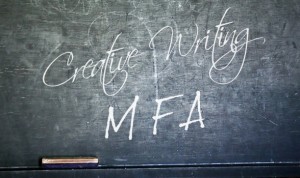I recently wrote a post about the MFA dilemma: should writers go back to graduate school or not? One of the reasons I gave for not recommending an MFA program to most writers is that most MFA programs have serious flaws. Today we address those flaws.
1) They’re expensive. Many MFA programs offer little-to-no funding. A recent ranking of MFA programs done by Poets & Writers magazine takes funding into account, giving it more weight. For details on the methodology of that ranking, see this article. Even so, funding does not solve all problems. Rarely do institutions give graduate students money for free, and often this funding comes with added responsibilities like teaching or research. Money’s great, but many times it comes with strings and lots of politics attached. Even if the MFA program you’re considering offers a full-ride plus stipend, find out exactly what responsibilities you’re signing on to before you snap up the funds.
2) The MFA concept is not based on reality. In his book, The Creative Writing MFA Handbook, Tom Kealey talks about how going to an MFA program is like “drawing a line in the sand… you are staking a claim to being a writer, and you’re letting everyone around you know it.” This idea that we as writers owe it to ourselves to invest in our writing is lovely. In theory. The problem is many writers dedicate themselves to their writing for two years and then what? Where do they go next? While I believe that we do want to stake our claim as writers, I don’t believe putting life on hold for two years is the way to do it. Instead, I think we owe it to ourselves to create a life where writing, literature and craft, are an integral part of our day-to-day. There is a time and place or putting life on hold to study and it’s called undergrad. Graduate school is about making your study an integral part of your life.
3) Many MFA programs can have a competitive streak. Part of what adds to the allure of the higher degree is that not everyone can have one. Some writers just don’t make the cut. Sure, the application process is a necessary evil because given how many writers want to attend and how relatively few open spots exist, there has to be a way of selecting who gets in and who doesn’t. The problem is that to get in to an MFA program, being a serious writer is often not enough. Most of the writers who end up getting the “We are pleased to inform you…” letter are already strong writers to begin with. The way the system is set up, the strong get stronger and the writers who are not as far along but have lots of potential end up falling through the cracks.
The competition doesn’t end when you get into the program. I saw some writers who were less developed in their writing receive harsh backlash from others. Some academic programs use competition to push the students toward success, but in writing success is not a zero-sum game. One writer’s triumph doesn’t automatically imply another’s failure. Sometimes when the competition bug sneaks up it’s hard to remember that.
4) Non-literary fiction is often discriminated against. I went to an MFA program where I was able to study Writing for Children. Despite graduates from this concentration having a strong publication record, Writing for Children students were often treated like the bastard stepchildren of the program. Most other students didn’t know our concentration even existed and those who did often were surprised that we “could actually write well.” These days, there are maybe a half-dozen or so programs that grant MFA’s in Writing for Children, and even fewer ones that consider commercial fiction (such as romance, thrillers, scifi or fantasy). Sure, literary fiction is wonderful–I’m a huge fan–but it’s only one slice of the literature pie. Considering how the publishing world is evolving, literary fiction isn’t exactly the fastest-growing slice either. So why aren’t other genres proportionately represented in the realm of MFA? That’s a subject of a whole other post. Suffice it to say that there are many fabulous writers exploring genres that are not strictly “literary” and that many of those writers would love a chance to deepen their study.
Take-Home Message: In the end, the loss isn’t that of the writers. There are plenty of ways that writers can gain the benefits of the MFA without actually doing an MFA. (We’ll get to that tomorrow.) The truth is, I feel bad for the programs themselves. By making MFA degrees available only to an elite few, these programs miss out on the benefit of interacting with many talented writers who are excited about their craft. While I certainly still stay in touch with many of my fellow MFA-folk, I have found several talented writers outside this community whom I am proud to call my friends, colleagues and mentors. People who do the MFA but don’t isolate themselves to it are the ones who benefit the most. The students who miss out are those who try to hold on to that MFA world forever.
OK, so I’ve expressed the flaws of MFA programs, and I’ve talked about the great things you can get out of an MFA. Next I’ll be sharing with a little more about DIY MFA and how you can fit some of those benefits into your life without actually doing an MFA. After all, DIY MFA is about creating an empowered and sustainable writing life and to do that we have to start by actually living.











 Call me Gabi (pronounced gah-BEE). I'm a writer, freelance teacher, and a lover of books and words. I'm also the instigator of DIY MFA. iggi's my sidekick, but he thinks he's the brains behind this operation.
Call me Gabi (pronounced gah-BEE). I'm a writer, freelance teacher, and a lover of books and words. I'm also the instigator of DIY MFA. iggi's my sidekick, but he thinks he's the brains behind this operation.
 ROW80 Check-In (4)
ROW80 Check-In (4) YA Cafe Book Club: The Unbecoming of Mara Dyer
YA Cafe Book Club: The Unbecoming of Mara Dyer YA Cafe: Building Suspense
YA Cafe: Building Suspense